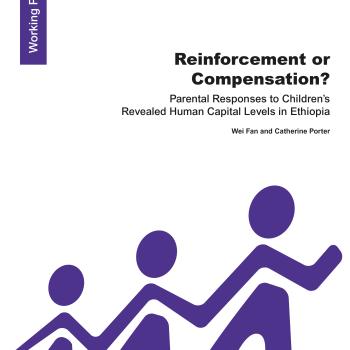
There is an increasing body of literature that finds that parents invest in their children unequally, but the evidence is contradictory, and few studies provide convincing causal evidence of the effect of child ability on parental investment in a low-income country. This working paper examines how parents respond to the differing abilities of primary school-age Ethiopian siblings, using rainfall shocks during the critical developmental period between pregnancy and the first three years of a child’s life to isolate exogenous variation in child ability within the household, observed at a later stage than birth.
The results suggest that on average parents attempt to compensate disadvantaged children through increased cognitive investment. The results are significant, but small in magnitude: parents provide about 6.3 per cent of a standard deviation more in educational fees to the lower-ability child in the observed pair. Families with educated mothers, smaller household size, and higher wealth compensate with more cognitive resources for a lower-ability child. This suggests that improving resources available to households would benefit the least advantaged young people.

There is an increasing body of literature that finds that parents invest in their children unequally, but the evidence is contradictory, and few studies provide convincing causal evidence of the effect of child ability on parental investment in a low-income country. This working paper examines how parents respond to the differing abilities of primary school-age Ethiopian siblings, using rainfall shocks during the critical developmental period between pregnancy and the first three years of a child’s life to isolate exogenous variation in child ability within the household, observed at a later stage than birth.
The results suggest that on average parents attempt to compensate disadvantaged children through increased cognitive investment. The results are significant, but small in magnitude: parents provide about 6.3 per cent of a standard deviation more in educational fees to the lower-ability child in the observed pair. Families with educated mothers, smaller household size, and higher wealth compensate with more cognitive resources for a lower-ability child. This suggests that improving resources available to households would benefit the least advantaged young people.

